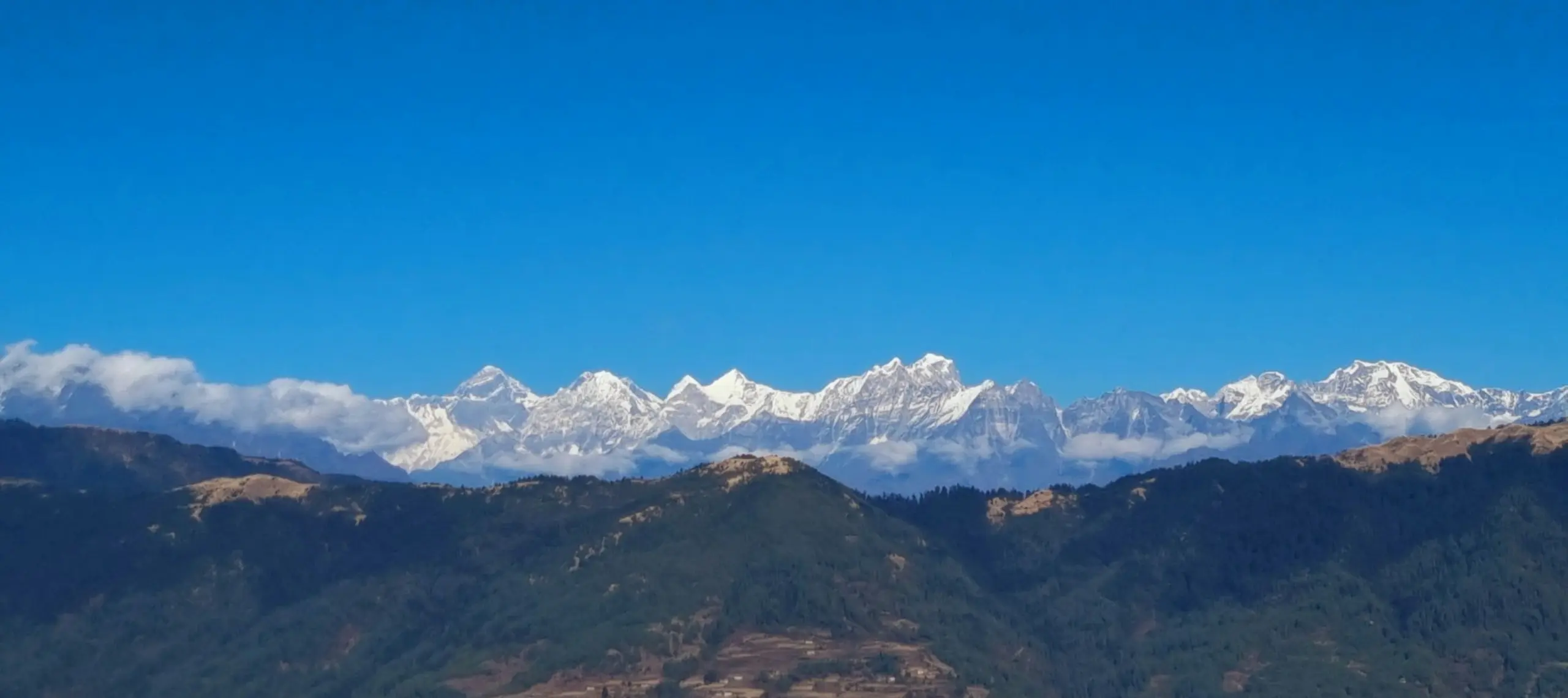
Mera Peak Climbing from Khare 4 days
USD 1,020 per person
| Activities | - | Fitness Level | Strenuous |
| Max Elevation | 6476m | Commute | Khare to Khare |
| Best Month | Autumn,Spring,winter | Group Size | Min: 2, Max: 10+,single |
| Arrival on | Khare | Depart From | Khare |
| Meal | B L D | Duration | 4 days |
| Stay | Tea House | Price | USD 1,020 per person |
Climbing the technically straightforward -Mera peak following the least trodden route of the Everest region entering the incredible Hinku Valley.
Mera Peak (6476 m) is the most popular and the highest trekking peak of Nepal that fascinates the spectacular views of peaks over 6000 m including the highest peak Mt. Everest (8848m) piercing the skyline. This technically straightforward Mera Peak Climbing is outstanding for those who wish to experience true mountaineering in Nepal. Passing some crevasses to maneuver around, the route can be long and demanding with the snowfall. Our itinerary for this Mera Peak Climbing is staring from Khare is suitable for the trekkers who wish to trek alone till Khare. Once the group will reach at Khare, our Sherpa will meet and guide you to take you to the High Camp. Our Itinerary is flexible and can be extend as per the requirement of the group even once the trek has been commenced. For the extend of days for climbing, additional charge is applicable. Kindly suggest us your requirement and we arrange the services.
Outline Itinerary:
Day 01: Meet the Sherpa at Khare and Trek to Mera base camp (Altitude: Mera La : 5,415m/17,766ft. Base Camp: 5,350m/17,552ft. Trek: 3/4 hrs. Meal: BLD)
Day 02: Climb to Mera high camp (Altitude: 5,750m/18,865ft. Trek: Meal: BLD)
Day 03: Summit day and descend to Khare (Altitude: 6476m/21,241ft. Trek: 8/9 hrs. Meal: BLD)
NOTE: Itinerary do not include Flight to/from Lukla. We can arrange it along with Kathmandu Services upon request.
Costs
Service Includes:
🟢 Permit for Mera Peak Climbing
🟢 Meals (Breakfast, Lunch, Dinner) starting from Khare till khare
🟢 Guide/Sherpas Insurance covering the High Altitude evacuation and medical
🟢 Makalu Barun National park Permit
🟢 Garbage Deposit Charge
🟢 Hiring Charge for Personal Gear
🟢 Group gears (Rope, Snow bar, Ice Hammer, Ice Screw)
🟢 All the government and local taxes and VAT as applicable
Service Excludes:
🔴 Kathmandu accommodation and Services
🔴 Kathmandu/Lukla/Kathmandu Airfare
🔴Trekking expenses till Khare
🔴 Nepal Visa - (Cost- US$- 30 for 15 days & $- 50 for 30 days)
🔴 Travel insurance
🔴 Cost of personal nature expenses, Beverages (Mineral water or coca-cola), cost of extra meals, snacks, phones bills, Internet, WiFi, laundry, etc.
🔴 The cost incurred during emergencies, evacuations
🔴 Tips for Guide/porters/driver ...
🔴 Anything other than not mentioned in “Service Includes”
Gears Required:
Personal Climbing Gears- need to hire or bring if you have: Ice axe Crampons Harness Tape Slings (2) Screwgate Karabiners (2 lock, 2 unlock) Descender/Abseil Device Plastic Mountaineering Boots Ascender Helmet (optional) Group Climbing Gears- is provided by the company: Snow bar* Rope* Ice Hammer* Ice Screw*
Map

Altitude Chart

DETAILED ITINERARY
Day 01: Meet Guide at Khare and Trek to Mera base camp (Altitude: Mera La : 5,415m/17,766ft. Base Camp: 5,350m/17,552ft. Trek: 3/4 hrs. Meal: BLD)
Today, you will make your way to Mera Base Camp. It will be a very short trek letting you acclimatize. You will climb to the crest of the moraine to steep slope of scree or snow to reach a boulder strewn bowl below the lower tongue of the Mera Glacier. Reaching the pass Mera La, you can see the enjoy the surrounding, then descend for a while towards the Hongu side and set up base camp in the moraine below the ice where you will camp for overnight stay.
Day 02: Climb to Mera high camp (Altitude: 5,750m/18,865ft. Trek: Meal: BLD)
You should be very much careful on your way to high camp. The trail can be hazardous if it has recently snowed, as there are a number of crevasses en-route. Making your way to the top of the rock band, which is marked by large cairn, you will set up high camp. It will be the final camp before ascending the peak. Let yourself refreshed with the outstanding view of mountain piercing the skyline. Your stay will be at high camp.
Day 03: Summit day and descend to Khare (Altitude: 6476m/21,241ft. Trek: 8/9 hrs. Meal: BLD)
Here comes the most awaited day of the entire trip. Today, you are going to summit Mera Peak. And you should wake up early at around 2 o’clock and get ready with crampons and rope. From High Camp, a well acclimatize group will summit peak in 3-4 hours. Just reaching at the peak, you can see the magnificent view of Mt. Everest (8,848m), Cho-Oyu (8,201m), Lhotse (8,516m), Makalu (8,463m), Kangchenjunga (8,586m), Nuptse (7,855m), Lubuche (6,145m), Chamlang (7,319m) and other mountains over 6 thousand meters. Taking some snap and enjoying the spectacular views of snowline, you will retrace your journey back to Khare after a while rest with some hot soup at high camp. Spend overnight at Khare.
DEPARTURE DATES
| START DATE | END DATE | STATUS | PRICES |
|---|---|---|---|
| 6th Nov | 10th Nov | Limited Seats |
$ 1,020
|
| 12th Nov | 16th Nov | Limited Seats |
$ 1,020
|
| 18th Nov | 22nd Nov | Limited Seats |
$ 1,020
|
| 24th Nov | 28th Nov | Limited Seats |
$ 1,020
|
| 30th Nov | 4th Dec | Limited Seats |
$ 1,020
|
FAQ
No FAQs available for this tour.
REVIEWS
No reviews yet.
RELATED TRIPS

Sunder Peak Trek
Sunder Peak, a short trekking in the Everest Region follows the traditionally and historically impor...
More Details
Pikey Peak Trek
Pikey Trek- short and outstanding trekking to the Himalayas viewing the stunning Himalayas including...
More Details
| 1 person | 2-7 person | 8+ person |
|---|---|---|
|
$ 1,020
Partial Pay
|
$
1,099
/ per
Partial Pay
|
$
1,050
/ per
Partial Pay
|




- Speak to one of our travel consultants
- Call Us (24/7) : +977 9802342080
-
 WhatsApp (24/7) : +977-9802342080
WhatsApp (24/7) : +977-9802342080
Planning a Trip?
We have a pool of travel experts working in this industry for more than a decade. Consult to get started
BOOK A CALL